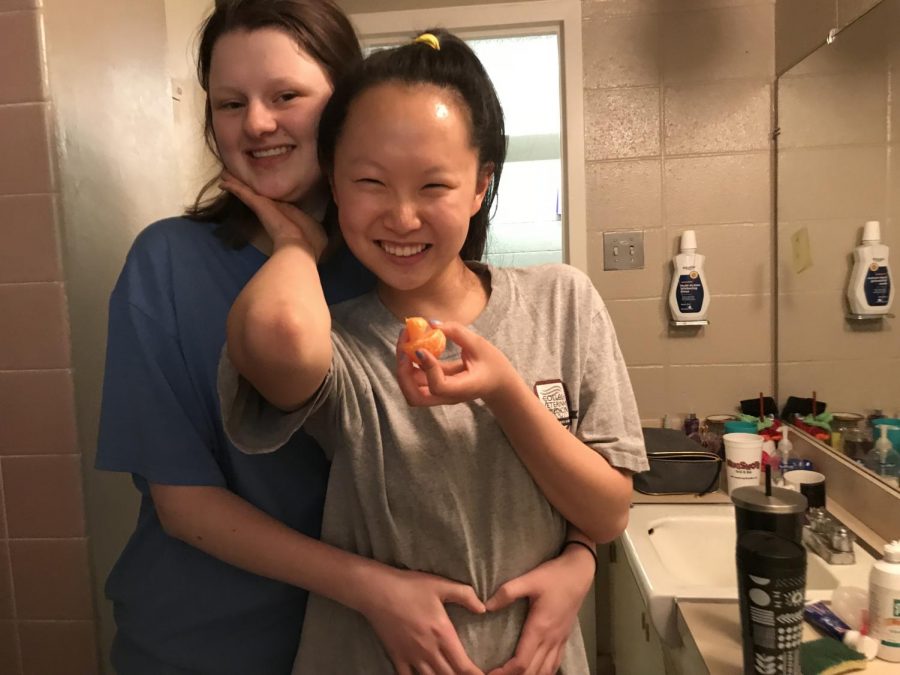Gong: The High School Love Dilemma
A happy couple: Victoria Waller (left) and Helen Peng (right).
April 23, 2018
Teenagers are weird. We say things constantly that aren’t exactly English—like “yeet” and “yah boi” and “rip dip”—yet we still expect to be taken seriously. We’re illogical. We shovel jam-packed to-do lists onto our plate, spend hours watching YouTube or scrolling through Twitter in procrastination, and stay an all-nighter to clean our plates, subsisting on coffee and candy. We’ve had limited exposure to the real world, so we make guesses on what to expect from it and ourselves. And we usually get it wrong. We either hope for too much when we know too much is impossible, and we’re crushed when it doesn’t work out. Or we expect too little and don’t give it our all, and in the end we regret not trying harder.
Being a teenager is definitely difficult and so is being with another teenager. Here at The Mississippi School for Mathematics and Science, we have a wide array of couples (thankfully both persons in each relationship are in their teens, that I know of). The optimal time and place to observe these couples on a weekday night is from 9:00 p.m. to 10:25 p.m. in the vicinity of the Hooper Academic Building or in the two residence hall lobbies. It takes a bit of practice, but eventually it will be impossible for you not to be able to spot an oncoming couple. Some of these relationships form quickly, go on for a few weeks, then fizzle out like a damp firework. Others have been chugging along since the beginning of the year like the loud, very annoying train that clanks through campus in the wee hours of the morning.
But, despite all of their shortcomings, if you were to call teenagers (and especially the ones in high school relationships) foolish, you’d find yourself mistaken, at least here at MSMS. Many students have good reasons to date, those that prevail over the desire in our puberty-stricken brains to be attracted to someone.
A student who wished to remain anonymous—we’ll just call her MSMS Student #1—stated that before coming to MSMS she “did not believe in high school relationships at all (or really any relationships, for that matter), but high school relationships especially.”
“I believed that you couldn’t start dating another person until you had ‘found yourself,’” explained Student #1, who is currently in a relationship. This past year, however, has convinced her that not all relationships are “just a waste of time.”
“Relationships should be an intimate bond where both people help and learn from each other,” Student #1 stated. “It’s not wrong that you need to have a good sense of self confidence before coming into a relationship but it is unrealistic to expect perfection too. What is essential is a good deal of respect—for yourself and your partner.”
Junior Mia Parker, who is not afraid of having her name associated with the stigma of high school romances and who holds half the title of junior class One True Pair, stated realistically that “high school relationships can go 50/50. Some are awesome and healthy and last. It’s kind of a give and take, and you have to find what’s good for you.”
Other MSMS students have honorable reasons to stay single. Anonymous Student #2 stated, “Kids should date after they have finished their education, have a secure job, and do not depend on their parents anymore.”
Student #3 claims she doesn’t have a personal reason to be against high school relationships. “I don’t really see the point in investing the little time that I have into a relationship that more than likely will not last more than two years,” stated Student #3. “One of my concerns regarding the social atmosphere at MSMS is that it seems that it is a rather couple-dominated atmosphere at times, especially during the night and during walks. Though I am glad that others are enjoying their time here at MSMS with their significant others, I could appreciate less PDA.”
Personally, I can entertain valid arguments from both sides. On one hand, education should be foremost in the minds of high schoolers, and caring about another person generally detracts from our studiousness. But happiness is also paramount—and good relationships can facilitate that and make our high school experiences more touching and memorable. On a deeper level, however, searching for meaning in a high school relationship is much harder to do. Some of my fellow classmates date to be happy and have a good time, and who am I (or anyone, really) to disrespect that behavior? According to Victoria Waller, an MSMS junior, stigma against high school relationships is “dumb,” and people should be allowed to “live their lives.”
“Who cares if [the relationship] doesn’t last more than a few weeks or months?” Waller stated. “It’s all a learning experience.”
In the end, there’s a difference between a good relationship and a lasting one, and in our positions, it’s difficult to tell which one we’re in. But you’ll never know until you decide to live a little.









